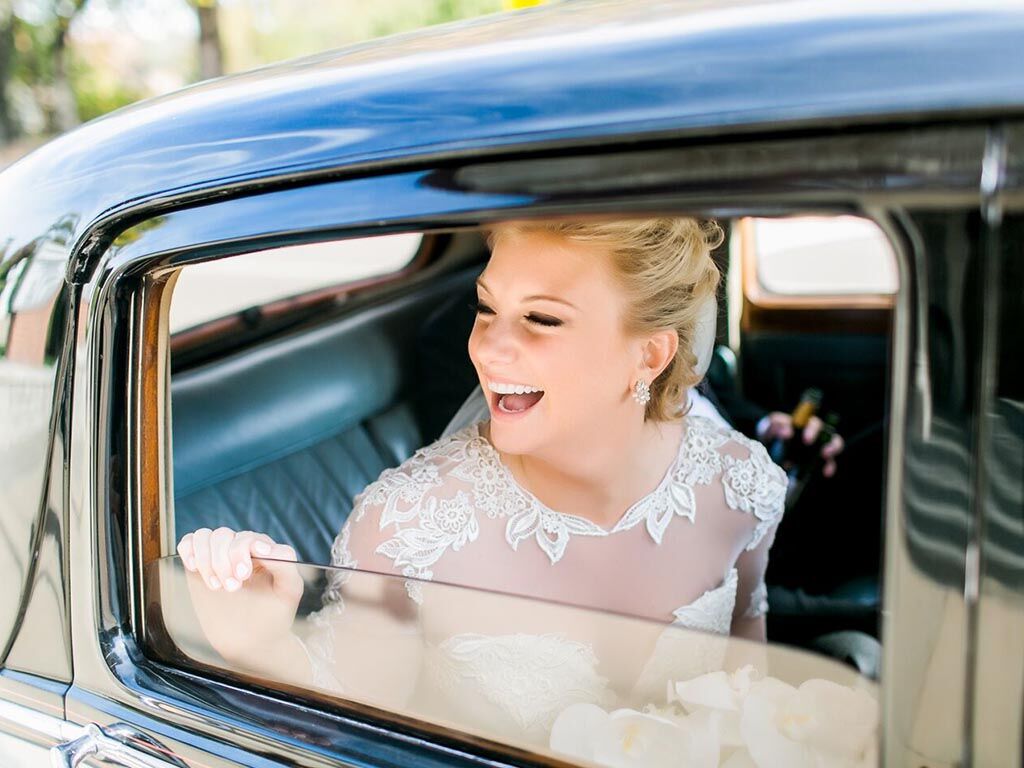How to Approach Not Inviting Difficult Family to Your Wedding
Most people want to share their wedding day with the most important people in their lives. Society tells us those 'important' people are usually family members, but that's not always true. What happens when you're not close to certain family members and don't want them at your wedding? In some cases, not inviting them is an option.
Not inviting family to your wedding can be a nerve wracking thing to do—it may even feel like you're going against a societal norm. Keep in mind that your wedding day is one of the biggest days of your life, so you're allowed to do it on your terms. That might mean letting some people down and not extending an invite. Here are some tips on how to approach not inviting difficult family members to your wedding.
In this article:
- Do You Have to Invite Your Entire Family to Your Wedding?
- Reasons for Not Inviting Certain Family Members to Your Wedding
- How to Not Invite Certain Family Members to Your Wedding
- How to Tell Certain Family Members They Aren't Invited
- What To Do if You Have to Invite Difficult Family Members
Do You Have to Invite Your Entire Family to Your Wedding?
Aside from inviting your entire family to your wedding (especially if you have a big one) being expensive, it might not be good for the vibes on the day either. So do you have to invite your entire family? In short, no, you don't.
"Weddings are very special and sacred ceremonies that represent two couples declaring their love for one another in a formal setting. A lot of time, effort and money goes into planning such a special occasion," says Jade Ladson, founder of Jade Ladson Weddings and Wedding League, a resource for soonlyweds. "When choosing who will be on your guest list it's imperative that you consider people that hold a special place in your lives, will support you throughout your marriage, and will generally be happy for you."
Reasons for Not Inviting Certain Family Members to Your Wedding
There are endless reasons not to invite a family member to your wedding. They could range from said members having bad attitudes, always trying to steal the show, or not respecting your partner. Here are a few reasons to not invite certain family members when you get married.
They don't support your relationship.
Family members who don't support your relationship shouldn't be invited to your wedding, Ladson says. This may mean not inviting parents to your wedding as well as cousins or extended family members who aren't rooting for you and speak badly about your relationship.
"This is a special day and you should be surrounded by people that love and support you well. These are the people that you will be able to lean on down the line when times get hard," Ladson says.
You had a falling out.
Family feuds are a thing and sometimes they last for years. If you haven't spoken to a family member in the past year or longer, you may not want to extend a wedding invite to them, advises Ladson, who has over a decade of experience in the wedding and events industry. After not speaking to said individuals for some time, the first time you break the ice probably shouldn't be one of the happiest days of your life. Risking having tension and negative energy floating around on your wedding day may not be worth it.
They're controlling.
We all know a family member who shows up to an event and suddenly wants to take over everything. To minimize stress on your big day, you may consider having said family member not turn up at your wedding.
"Weddings already come with a certain amount of stress so it's imperative that you reconsider adding people that are overly controlling, confrontational and want to be the center of attention," says Ladson. "You need to be able to enjoy your friends and family as well as bask in the beginning of your happily ever after."
How to Not Invite Certain Family Members to Your Wedding
We've established you don't have to invite difficult family members to your wedding. Now let's explore how you go about the difficult part of actually not inviting them.



Prep them for the convo.
Think about what you want to say and how you want to say it before actually having a conversation with family. You can then prepare your family member for the conversation versus just springing it on them.
Ladson provides a real-life example of how you could go about it. You could say, "Hi _______ I'd like to speak with you about the guest list for my wedding. When would be a good time for us to chat?"
If you're dealing with overwhelming nerves, practice the convo with a loved one beforehand.
Lean on reasons like venue constraints.
If you don't want to tell family members straight up they can't come, you can lean on reasons like venue constraints, budget constraints or not having space on your guest list.
"This is always a safe route to take especially if your venue is small and can't house a large number of people," says Ladson.
In case you do decide to run with this strategy, prepare for pushback from said family members or them feeling like they weren't prioritized. Just remember this day is about your needs, not theirs.
How to Tell Certain Family Members They Aren't Invited
Depending on how good you are with difficult conversations, you may get sweaty palms, find your heart race speeding up and your voice trembling. Ladson suggests leading with honesty.
"Be honest and let them know your concerns and that you feel like it just wouldn't be a good idea based on any of [your] reasons," says Ladson.
Here are a few examples Ladson provides on how to have the conversation..
- Over the past few years, our relationship hasn't been the greatest and while I'm open to working on that… I just don't think my wedding day is the place to hash it out
- Hi _____________, while I love and respect our relationship/friendship I will not be able to invite you to my wedding because __________
Before you have the conversation, prepare for negative outcomes such as your family member getting offended or lashing out about it. Be ready to stand your ground and set any necessary boundaries to protect your peace. Also, remember a clear boundary should also have a consequence, so think about what yours will be beforehand. For instance, if a family member insists on arguing or says they'll show up despite them not being invited you could say:
"I understand you're disappointed or upset, but if you turn up to my wedding, you'll be escorted out."
Likewise, if they want to engage in an argument about your decision you could say,
"I understand you feel hurt by my decision but I would like you to respect it as I won't change my mind. If you can't, I'm going to end this conversation."
What To Do if You Have to Invite Difficult Family Members
In some cases you may have to invite difficult family members to your wedding. Perhaps your annoying aunt's daughter is your flower girl. Or your grandfather can't attend without your combative grandma coming to help him move around.
Ladson says in this scenario, you can use your wedding planner as a buffer. Strategize with them so you can prevent any situations that could cause issues on your day.
"Have [them] keep them away from you or any guests that they may have an issue with or have [them] monitor their alcohol intake and alert the bar to start watering their drinks down on cue or cut them off discreetly," she says.
She also advises having a talk with your problematic family member beforehand. Set clear expectations in terms of behavior and etiquette for family members who you'd rather not invite but have to. Also, communicate clearly what the consequences of them not meeting those expectations will be.
A final tip is to invite them to certain parts of the wedding versus all. For example, you could invite them to the ceremony and cocktail hour but not to the reception, says Ladson.





















